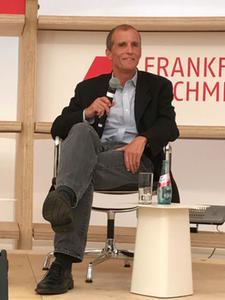 |
|
| Macmillan's John Sargent at the Frankfurt Book Fair yesterday. | |
In a wide-ranging, optimistic talk at the Frankfurt Book Fair yesterday afternoon, Macmillan CEO John Sargent discussed everything from the reading habits of young people and competition with smartphones to the usefulness of e-books and the future of the book. He also discussed the importance of free speech, democracy and his reaction to President Trump's attempt to block publication of Michael Wolff's Fire & Fury, reiterating points he made during a talk at BookExpo in May. Sargent fielded questions from several industry journalists while publishing consultant Ruediger Wischenbart moderated the discussion.
When asked about the changes that the Internet revolution has had on the publishing industry, Sargent acknowledged that certain sectors of the book business, such as travel guides and travel books, which were once "highly necessary," have largely "fallen away globally," because the Internet can simply do a better job of fulfilling those needs. But at the same time, Sargent continued, it has brought increased focus to the things that books can do better than anything else.
Sargent contended that for the sorts of long-form narratives that do really well in today's publishing landscape, the book remains "the best possible technology" for delivering that content. He remarked that he was old enough to remember when color TV came around and how it was supposed to "crush" the book business, and added that he'd heard stories that publishers had looked at consumer radio in the same way. Compared to other forms of storytelling, reading a book is simply a "much more powerful experience."
In a similar vein, Sargent commented that for at least the past 15 years, people have been worrying about attention spans and how little time young people spend reading. But 250- to 400-page books remain the norm, the predicted downturns in the business haven't materialized and young people even prefer the printed book over e-books. History has shown, Sargent said, that "people do in fact continue to read."
And while there certainly is more competition for the attention of young people than ever before, Sargent called it the "responsibility" of publishers to "produce extraordinary works" that will make them turn away from their smartphones. He also said that he didn't "despair" about that competition, because people typically read more as they grow older.
He added that he also did not "worry much" about the possibility of young artists, writers and content creators turning away from the book. Figures about self-publishing show that "millions and millions of people" are investing immense time and energy into writing books, and there is "tremendous work" being done by young authors. Said Sargent: "I don't see that changing."
On the subject of major publishers expanding across the globe in recent decades, Sargent noted that going global has always been an "interesting premise," but for generations the number of books that truly work across the globe has been low. Most book markets tend to be "very local in their nature," with readers typically interested in titles written in their home language published in their home country.
Later in the discussion, Sargent remarked that even in countries where Macmillan has been operating for a very long time, there are still stories and voices that aren't being heard and populations that are not being served. Finding and publishing those stories, he said, is not only the "right thing to do" but also the "self-interested thing to do," because the population in 10 years "won't look like it does today."
Sargent said that despite e-books no longer being the growth engine that they once were, the format remains "tremendously powerful," as it helps publishers reach readers in "whatever format they choose," and "wherever they are." He noted that when Wikileaks pushed an unprotected PDF of Michael Wolff's Fire and Fury, it likely resulted in some 400,000-500,000 lost sales for Macmillan, and he recalled that when he heard Hachette Livre CEO Arnaud Nourry dismiss the e-book as a "stupid product," his first reaction was, "Boy, what is this guy smoking?"
When asked about Macmillan's decision to delay the e-lending of digital titles for a certain amount of time after publication, Sargent said Macmillan had seen a "corresponding one-for-one growth" in library reads that went along with a decrease in sales of e-books, which had become a "matter of concern." He added that the company was currently in a roughly three-month testing period, and would make more decisions after that.
During the discussion's q&a portion, an audience member commented on the feud between Donald Trump and Jeff Bezos and asked Sargent which side he would hypothetically support. Replied Sargent: "I think I'll go with a no comment." --Alex Mutter

